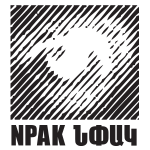Artist Statement
My art is a clew of bourgeois idleness, which contains sticky judgments and “wise” discussions on art and worn out cliché testaments on life. My art is a manifest of many screaming confessions. It spreads and grows unnoticed and monotonously out of your vanity and boredom, of your survival problems, of hysteric outbursts of your own women, and of your parents’ possessive and flagrant posture.
My art is the wrapping of the remnants of a chocolate-bar and crushed cigarette boxes. My art is hygiene of the morning coffee and sexual organs. It opens into a wide road and technological acceleration leaving unique traces of memoirs of objects of a morsel of time.
Artist: Kariné Matsakyan
Curator statement
“Culture survives due to harshness”
Friedrich Nietzsche
What is culture? A cage, which confines man’s freedom? Or a support, which helps man to live? This question is in the foundation of all of Kariné Matsakyan’s performances.
When the artist prefers creative process over the final product, the canvas turns into a performance. As in the process of painting, in Kariné Matsakyan’s videos, in her installations and performances, the subject is her very body. By displaying the condition of the body in contemporary society, she affirms that human aspirations by their nature are social.
Conflicts between the spiritual and the material, as well as the natural and the artificial, or the lower and the higher, are outcomes of flexing patriarchal muscles for dominating the nature. But considering the material as an inferior animal impulse is nothing more than uncontrolled tendency for suicide.
In the 20th century concurrent with activation of women’s social role, appeared new aspects of appreciation. Occupationism was countered by communication, which was specifically contribution of women’s artistic and philosophical thought.
In Kariné’s works body is considered cultural discourse. The openness and immediacy in her works convey trust in destiny and insists that there is no return to the obsessive conflict between nature and culture.
Curator: David Kareyan


